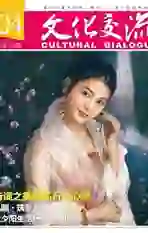越剧视阈中的《牡丹亭》
2017-04-14郭梅
郭梅
当《牡丹亭》遇见越剧
2016年是明代戏剧家汤显祖逝世400周年。汤显祖自评“一生四梦,得意处惟在‘牡丹”。其梦被后人用多种声腔演绎,还有英、日、德、法等外文译本传播于海外,形成这一杰作丰富的外延。
越剧作为一个以浪漫抒情见长的年轻剧种,在对《牡丹亭》的改编中,显然颇值得关注。越剧改编《牡丹亭》,难度非常之大,完成从曲牌体到板腔体的跨越殊为不易,从55出的传奇到两个多小时演完的“大戏”,原著虽然非常经典但几乎没有可倚恃之处,必须重起炉灶。几代越剧艺术家知难而上,陆续推出几个不同的版本,不断创新越剧改编《牡丹亭》的历史。
从20世纪80年代以来,越剧艺术家们一直致力于改编《牡丹亭》,编导有红枫、李卓云,有吕建华、陶铁斧,也有颜全毅和周龙、刘平等,主演则是各时期各剧团的台柱子,而且值得注意的是流派纷呈。
从对昆剧和原著亦步亦趋的“模仿”到有意识的解构和颠覆,从追求“原汁原味”到在保持越剧传统审美的前提下将现当代人的思考结合进去,服装、舞美等亦与时俱进,越剧的《牡丹亭》改编演出史,折射的就是这些年来越剧剧种嬗变和发展的历史。
从“静安版”到“浙越版”
30余年前,上海静安越剧团首先把《牡丹亭》改为《还魂记》演出。该剧在越剧唱腔特色中,融入昆曲、沪剧的某些元素,使唱腔更趋饱满,可以说实现了越剧改编《牡丹亭》“零”的突破,开创之功,功不可没。但演出该剧的戚派,毕竟以“悲旦”著称,似与《牡丹亭》的浪漫气氛不甚契合。
随后,浙江越剧团也上演了《牡丹亭》。在故事形态和主题呈现上,“浙越版”与“静安版”一脉相承。编剧吕建华认为,《牡丹亭》的情节基本没有人与人之间的正面矛盾冲突,这看起来是一个缺憾,实质上却是一个特点和优点。汤显祖摆脱了以往剧作家那种依靠外部冲突来结构故事的窠臼,而是将戏引向了人的内心深处,通过主人公内在的心理冲突来结构故事的手法,揭示了个性化的心灵历程和人物的感情世界。长达55出的原著被“浙越版”压缩到两个多小时,演完“闹学”“游园”“惊梦”“拾画”“叫画”“回生”“硬拷”七出,塑造了又一对越剧舞台上的杜丽娘和柳梦梅,成为浙江越剧团的保留剧目。
2008年12月, 5集高清越剧电视连续剧《牡丹亭还魂记》在昆山千灯古镇开机。导演陶海说,该剧主要采用虚实景相结合的方式拍摄,在搭棚拍摄的基础上,还在千灯镇进行外景实拍,力图以现代影视技术为越剧艺术增色。值得强调的是,该剧由昆剧表演艺术家华文漪和岳美缇进行跨剧种艺术指导。岳美缇说:“越剧的浪漫抒情和此剧很吻合,即便小生王君安的气质,也非常合适柳梦梅的儒雅清新和温和潇洒。”该剧取得了一定的成功,为古老的名剧《牡丹亭》注入了新的活力。
实验性的小剧场演出
相对于上述两部大戏,小剧场越剧《牡丹亭》和实验戏曲《情问三叠》(也名《还魂三叠》)显然在艺术理念和艺术风貌上迥异其趣。
小剧场越剧《牡丹亭》由上海的802戏剧工作室和上海演出家艺术团联合打造。它大胆突破传统越劇的故事模式,结合话剧、电影、舞蹈中的多重元素,抛开原著的词白,重新审视、解构与改写,通过现代生活中一生一旦的视角,去亲历古典的浪漫传奇,并由此反观自己的生存现状,感受现实与理想在普遍意义上的调和两难,形成全新的诠释。该剧保留了原著中“游园”“惊梦”“幽媾”等经典内容,又加以全新演绎,将现在与过去、现实与梦境等多重时空交织在一起,更大胆地添加了“七年之痒”。这是一个有关对峙与对话的戏,是越剧与话剧、传统与现代、演员与角色、生活与梦想、自己与自己沟通交流的戏。它熔诸多艺术元素及网络语言于一炉,使越剧焕发出全新的艺术品格和气象。
2010年首演的小剧场实验戏曲《情问三叠》取材于古典戏剧名作《红梅记》《牡丹亭》 和《水浒记》,撷取其中“救裴”“幽媾”和“活捉”三个经典的折子,以李慧娘、杜丽娘、阎惜姣三个女鬼因爱而殁、因爱还魂的情节为起点,展示三个女子的命运和情感历程。
这一“国戏版”的编剧颜全毅说,这样三个有故事的女鬼、有表演特色的形象,交叠放在一个舞台上呈现,舞台风貌自然同传统的戏曲完全不同。为了调和剧种之间的兼容,淡化剧种的界限,该剧以三种色彩乐器古筝、琵琶和埙代替各剧种原有的主奏乐器,其中,用越剧演绎的杜丽娘的唱腔以古筝的华美温和进行体现。
不断创新的改编
2014年底,浙江越剧团又推出越剧音乐诗画剧《牡丹亭》。该剧由汪世瑜任艺术总监,陶铁斧任编剧兼导演,两位主创的昆剧背景奠定了这一“浙越版”《牡丹亭》典雅诗意的艺术特质。这出集诗、画、音、舞、光、声于一体的新戏大胆创新,在唱词、舞台设置、音乐等方面都有创新性改编,还运用倒叙、闪回等现代派的表现手段,用现代影视艺术手法来演绎古代名剧,将中国古典与当下时尚结合在一起,力图在戏曲回归本体和诗意浸润观众之间达到一种有效的平衡。
2016年,为纪念汤显祖逝世400周年,福建芳华越剧团将“国戏版”《牡丹亭》进行重新排演,上演了新编越剧《柳梦梅》。
如果说,“静安版”和“浙越版”取得的是“越剧从此有了《牡丹亭》”的重要的突破性成功,那么,两部小剧场作品则在我国小剧场戏曲的缓慢发展潮流中应运而生,基本符合年轻人的审美需求。“国戏版”在《情问三叠》小试牛刀取得成功的基础上,被改成“芳华版”《柳梦梅》,这虽属“命题作文”,但却是戴着镣铐跳出来、让观众眼前大亮的舞蹈。颜全毅为中国戏曲学院第一个越剧本科班量身定制的《牡丹亭》,成为越剧改编的一个里程碑式的作品。换言之,“国戏版”让越剧不再只是有了《牡丹亭》,而是有了和昆剧完全不同的《牡丹亭》,有了适合越剧女小生演绎的《牡丹亭》,也有了契合当下时代精神与观众审美需求的《牡丹亭》——值得强调的是,它是大戏,并面向所有观众。
也许,下一版的越剧《牡丹亭》,不是改编,而是重写,即根据汤显祖原著,真正脱离昆剧的拘囿,用纯越剧的手法演绎一个完全姓“越”的《牡丹亭》。或者说,就是在似与不似之间,化“昆”金为“越”金,创造出更新更美的越剧《牡丹亭》。让我们拭目以待。
Since Tang Xianzu passed away 401 years ago, , one of his four dream plays, has become a representative classic in the repertories of various regional operas across China. The play has been translated into several foreign languages. Yueju Opera, a 100-years-old opera genre best for lyrical portrayal of romances, has tried to adapt the play to Yueju Opera performance since the 1980s.
Adapting script to Yueju Opera performance remains a big challenge. The original script has fifty-five acts and lyrics written to various set tunes. A performance of the original 55 acts could last a few days. It wouldnt be easy to reduce it to a theater production of about two hours. The classical script must be rewritten in order to play it at one show. Over the past decades, Yueju Opera artists have tried several versions.
The first Yueju Opera version of was staged in 1982 by Jingan Yueju Opera Troupe based in Shanghai. The adaptation told a part of the whole story and was called. The performance absorbed some elements from the Kunqu Opera and the Huju Opera. It was the first trailblazing success. However, the Yueju play was staged in the style of Qi Yaxian, a celebrated Yueju Opera artist who was and is famed for her tragedies. Some critics considered the style somewhat disagreed with the romance.
Zhejiang Yueju Opera Troupe staged its own version in the 1980s. This production followed the Jingan version. The successful adaptation is now among the repertoire of the troupe.
These two productions in the 1980s, considered a Yueju Opera breakthrough, are the first two Yueju Opera versions of the classical masterpiece.
In December 2008, a five-episode Yueju Opera play featuring was filmed in Kunshan. It was filmed both inside the film studio and in locations across Qiandeng Town, Kunshan. Two Kunqu Opera artists Hua Wenyi and Yue Meiti acted as art advisors, giving it a beautiful touch of Kunqu Opera.
In 2004, a group of Yueju Opera artists in Shanghai launched a brand new production of in Shanghai at an experimental theater. It was a unique adaptation, deconstructing the original script, integrating elements from drama, film, dance, resetting the play in a modern society to reflect dilemma in life and clashes between reality and dream. In 2010, another experimental play was staged by the Yueju Opera students at China Drama Academy based in Beijing. One act highlighted the heroine of . The two experimental productions were geared toward the youth market.
Toward the end of 2014, Zhejiang Yueju Opera Troupe tried again after about three decades. The new adaptation was an artistic production of music, poetry and painting. Wang Shiyu served as art director and Tao Tiefu rewrote the script and directed the play. The bold new effort introduced flashbacks into the storyline and adopted some modern cinematic techniques.
In 2016, Fanghua Yueju Opera Troupe in Fujian, a province south of Zhejiang, introduced a new adaptation, based upon the 2010 script written by Yan Quanyi. The production was staged by Yuejue Opera students of China Drama Academy. This script is considered a landmark breakthrough for Yueju Opera. written for Yueju Opera students, the first bunch of Yueju Opera artists ever cultivated by the Beijing-based academy, is a breakaway from the stereotype of Kunqu Opera. It suits all-women performance of Yueju Opera and it satisfies modern aesthetic requirements. And it is a big-stage theater performance aimed to attract all theatergoers, not an experimental production designed to appeal to a small number of people.
It can be well expected that Yueju Opera artists will not stop trying to reproduce the play in a good Yueju Opera style. Maybe the next version will not be a mere adaptation. It can be something rewritten on the original play by Tang Xianzu and a total breakaway from the stereotype of Kunqu Opera. Tangs original script and the modern time will certainly inspire next generations of playwrights and Yueju Opera artists.
